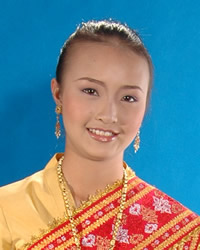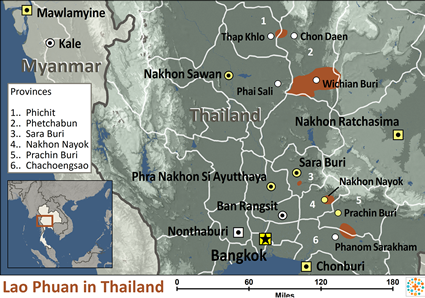The Lao Phuan claim to be the descendants of the Tai branch of peoples. During the thirteenth century, the Tai immigrated to Thailand from southwestern China because of Chinese oppression. As they journeyed, they conquered many peoples and cultures along the way. From 1827 to 1890, they took many of the Lao Phuan from Laos to Thailand as captives of war. The largest majority, however, remained in Laos. Throughout their history, repeated cycles of warfare and resettlement have caused massive social upheaval for the Lao Phuan.
Most Lao Phuan live in Laos while another large group live in neighboring Thailand. Both groups speak Phuan. In Thailand, the term Lao Phuan usually means "transported Lao," and refers to any Lao-speaking person. However, the Lao Phuan are a distinct, socially prominent ethnic group who value their own language and identity.
In general, the Lao Phuan are hardworking, honest and peaceable. They are thrifty and habitually save things for future use. Most are subsistence farmers living in fertile, green valleys where they cultivate wet-rice. They make use of irrigation and terraces and also engage in some "slash and burn" agriculture on the mountain sides. Some Lao Phuan, especially in villages along trade routes, have specialized in occupations other than farming, such as blacksmithing. New road construction projects in the area are allowing more accessibility to markets for them. In addition, as the economy improves, rice farmers have found new jobs as merchants, businessmen, skilled workers, and civil servants.
A village headman dispenses social justice in the presence of village elders. Within the villages, the wealthier Lao Phuan live in sturdy, teak or mahogany paneled houses that are raised off the ground and have a plank floor and tile roof. The less wealthy live in low-pitched, bamboo-framed houses with thatched roofs and earthen floors. The most important institution in the village is the Buddhist temple, which symbolizes unity and provides a variety of activities for the people.
The basic social unit of the Lao Phuan is the family. Although the foundation of their social structure is patriarchal (ruled by males), relations between husband and wife are harmonious. There is almost no division of labor by sex. Both men and women plow, fish, cook, tend babies, clean house, and wash clothes. The Lao Phuan women sometimes give themselves and their children to prostitution for economic reasons.
While the Lao Phuan of Thailand are primarily Buddhist, nearly all practice folk animism, a practice in which they seek help through the worship of spirits and objects. They blend Buddhism and animism to where they rarely know the difference. Lao Phuan social life revolves around "merit-making" ceremonies, ordinations of monks, marriages, and housewarmings, which have Buddhist roots. But they also honor the spirits in Bangkok through a large annual celebration called the "ceremony of the rice packet." They believe in guardian spirits and locality spirits, which they identify with different levels of society. They believe one must please these spirits in order to avoid curses and receive blessings. Such worship produces spiritual bondage and tragic consequences for them.
The Lao Phuan people await a spiritual breakthrough where they put their trust in Jesus Christ rather than the spirit world for their needs.
Pray for the Lord to give the Lao Phuan people an abundant harvest this year as a sign of his power and goodness.
Pray for the blessing of Lao Phuan families and communities as they embrace Jesus Christ, the Lord of Lords.
Pray for a movement to Christ that will enrich the Lao Phuan community.
Pray for spiritual openness to Jesus Christ that will not be hindered by the false belief in religious institutions rather than the person, Jesus Christ.
Scripture Prayers for the Lao Phuan in Thailand.
| Profile Source: Joshua Project |

























